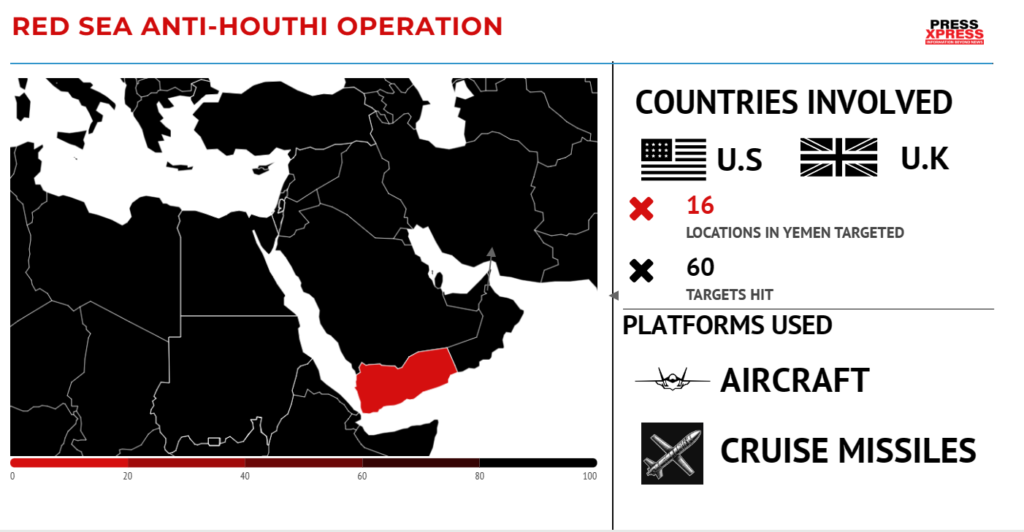A UN official revealed that Yemen’s Houthi rebels have issued an ultimatum to all UN staff and agencies with US and UK citizenship to vacate the country within a month. The Houthi authorities in Sanaa, the rebel-held capital, sent a letter to the UN resident coordinator on January 20, which was circulated on social media, stating that staff with British and US nationality had one month to “prepare to leave the country”.
Observers say that all these reactions came from Houthis as the US and the UK launched airstrikes on their positions. The strikes came after the Houthis escalated their attacks on international shipping in the Red Sea, using missiles and drones to target vessels and ports.
You can also read: Reasons for Myanmar Junta Moves To Build Rakhine Seaport Amidst Chaos
The US and the UK said they were acting to defend their interests and allies in the region, as well as to ensure the security of global trade and navigation. They also blamed Iran for supporting the Houthis with weapons and training, a claim that Iran has denied.
The airstrikes targeted the Houthis’ bases in Sana’a, the capital, and other locations, where they have been launching their attacks. A Houthi official confirmed that the “enemy” was bombing Sana’a, and a witness said he heard three loud explosions in the city.
Since November, Yemen’s Houthi rebel group has launched attacks on vessels traversing the strait of Bab al-Mandab, a 20-mile (32km) wide passage that separates north-east Africa from Yemen on the Arabian Peninsula. They allege to be targeting vessels with ties to Israel following the onset of the war in the Gaza Strip.
They have employed a range of weapons, from heavily armed hijackers to missiles and drones. For seafarers ensnared in the turmoil, it must be horrifying. A tanker, for instance, could transport around one million barrels of highly combustible oil. The crew of the MV Genco Picardy – which was carrying phosphate rock – escaped unscathed and managed to put out the fire sparked by the incendiary drone.
International Response

The Houthi rebels have been fighting the internationally recognized government of Yemen since 2014, and have controlled most of the north of the country, including Sana’a, since 2015. They have also been resisting a Saudi-led coalition that has been backing the government with air and ground support.
The conflict has caused a humanitarian crisis in Yemen, where millions of people are facing famine, disease, and displacement. The UN has called for a ceasefire and a political solution, but the warring parties have failed to reach a lasting agreement.
President Joe Biden has warned the Houthi rebels in Yemen that he will not hesitate to order more airstrikes on them if they continue to attack international shipping in the Red Sea. He said the airstrikes that he authorized, along with the UK and other allies, were a direct response to the Houthi’s use of anti-ship ballistic missiles, a first in history, which posed a grave threat to US personnel, civilian mariners, and their partners.
“I will take any necessary measures to protect our people and the free flow of international commerce,” Biden said in a statement. He added that the Houthis’ actions were “reckless and irresponsible” and that they must stop their aggression and engage in a peaceful dialogue.
The impact of the attacks on global trade
An estimated 12% of global trade traverses the Red Sea every year, valued at more than $1tn (£790bn). However many shipping firms have started shunning the area completely. Hundreds of colossal container ships, some of them exceeding 300m (984ft) in length, are now opting for a protracted detour around the continent of Africa instead of heading up the Red Sea and through the Suez Canal on journeys from Asia to Europe. But redirecting such large vessels is no simple feat – the logistics involved can be immense and time-consuming.
In other places, the acute drought afflicting the Panama Canal and the war in Ukraine – which has hampered grain shipments via the Black Sea – is also choking global supply chains. There is a need to adjust and redirect, though it comes with grave financial and environmental repercussions.

In November last year, the Houthis seized a car carrier and broadcast a video of the incident to the world. Their explosive weapons have also hit container ships, and bulk carriers and barely missed a Russian oil tanker – the latter targeted, seemingly, by accident. US and UK military operations aimed to safeguard ships and discourage the Houthis have also joined the fray.
Apart from the peril to life, sailing into such a whirlwind means higher insurance premiums, potential legal issues, and erratic delays. The cargo carried by these vessels can be worth millions to hundreds of millions of dollars. So, it is no wonder that shipping companies have decided, in many cases, to send their vessels elsewhere.
The volatility of the Red Sea and Middle East region
The Red Sea and Middle East region have become increasingly unstable. With Iran-backed Houthis striking ships. Iran itself striking targets in Pakistan and Syria. The war in Gaza is not seeing any resolution in sight. The entire region rests on separate large fires that might just merge into a large inferno. Should that happen, the world would experience the effects.


